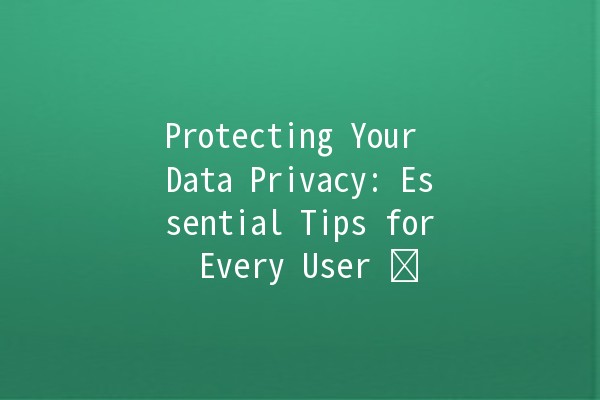
In today's digital age, data privacy is more than just a buzzword; it's a necessity. With the increasing number of data breaches and cyber threats, protecting your personal information online has become paramount. This comprehensive article aims to provide practical and actionable tips for safeguarding your data while using various online services. By implementing these practices, you can significantly enhance your data privacy and maintain control over your personal information.
Why Data Privacy Matters 🤔

Data privacy refers to the proper handling, processing, and storage of sensitive information. As technology continues to evolve, so do the tactics employed by cybercriminals. Personal information, such as email addresses, passwords, financial details, and location data, can be exploited for malicious purposes if they fall into the wrong hands.
The importance of data privacy can be highlighted through various incidents, such as:
Data Breaches: Major companies have experienced highprofile breaches, compromising millions of users' personal information.
Identity Theft: When your personal information is stolen, it can lead to fraudulent activities that damage your financial standing and reputation.
Surveillance: Governments and organizations may track online activities, leading to concerns about civil liberties and privacy.
All these factors underscore the need for robust data privacy protection practices.
The Importance of Strong Passwords
One of the simplest yet most effective ways to protect your data is by using strong and unique passwords for each of your online accounts. A strong password typically includes a combination of upper and lowercase letters, numbers, and special characters. Avoid easily guessable information like birthdays or common words.
Implementation Example
Consider using a password manager application, such as LastPass or 1Password. These tools can generate complex passwords for you and store them securely. For instance, instead of using "Password123," a password manager could suggest something like "r8Y#r!3x$9qT&z@1," significantly enhancing your account's security.
What is TwoFactor Authentication?
Twofactor authentication adds an extra layer of security to your online accounts. In addition to entering your password, 2FA requires you to verify your identity through another method, such as a text message or an authentication app.
RealLife Use Case
When you enable 2FA on your Google account, for instance, you'll need to enter your password and then confirm a code sent to your phone. This means that even if someone obtains your password, they would still need access to your phone to log in.
Risks of Public WiFi
Public WiFi networks are convenient, but they come with significant risks. Cybercriminals can intercept your data on unsecured networks and gain access to sensitive information.
How to Stay Safe
If you need to access public WiFi, consider using a Virtual Private Network (VPN). A VPN encrypts your internet connection, making it more difficult for anyone to access your data.
For example, when using a public WiFi network at a coffee shop, connecting through a VPN like NordVPN or ExpressVPN can protect your sensitive data from being intercepted.
Why Updates Matter
Software developers frequently release updates to patch security vulnerabilities. Failing to update your applications and operating systems can expose you to various cyber threats.
Implementation Steps
Automatic Updates: Ensure that your devices are set to automatically download and install updates. Most operating systems have this feature enabled by default, but it's worth doublechecking.
Manual Checks: Regularly check the official website or app store for any available updates, especially for critical software like browsers or antivirus programs.
For instance, if you use software like Microsoft Office or Adobe Creative Cloud, make sure to install updates regularly to close any security gaps.
The Dangers of Oversharing
Many users unknowingly share excessive personal information online, whether through social media, registrations, or apps. This can lead to unwanted solicitations or even identity theft.
Practical Steps to Take
Privacy Settings: Adjust the privacy settings on social media platforms to control who can see your posts and personal information.
Mindful Sharing: Before posting anything online, ask yourself if the information is necessary to share.
For example, instead of sharing your full birth date on Facebook, consider only sharing the month and day, making it harder for potential identity thieves to access your full personal profile.
Common Questions About Data Privacy
Data privacy refers to the right of individuals to control their personal data and the manner in which it is collected, stored, and used. It encompasses protecting personal information from unauthorized access and ensuring that organizations manage this data responsibly.
Several services can alert you if your email address appears in data breaches. Websites like Have I Been Pwned allow you to enter your email and check for any recorded breaches associated with it.
While free VPNs can provide some level of anonymity, they may compromise your data's safety. Many free services log user activities, which could be sold to third parties. Consider investing in a reputable paid service for better protection.
If you believe your data has been compromised, immediately change your passwords, enable 2FA, and monitor your financial accounts for any suspicious activities. It may also help to notify your bank and credit monitoring services.
Use reputable antivirus and antispyware software to scan your devices regularly. Additionally, avoid clicking on unknown links and be cautious when downloading files from the internet.
Under laws like the General Data Protection Regulation (GDPR), consumers have the right to request information about the data that companies hold on them. You can contact the company directly to inquire about your data.
Maintaining Vigilance and Awareness
, protecting your data privacy requires a proactive approach. By implementing these essential tips—using strong and unique passwords, enabling twofactor authentication, being cautious with public WiFi, regularly updating your software, and limiting personal information sharing—you can significantly enhance your online safety and privacy.
al Thoughts
Awareness of your digital footprint, coupled with diligent security practices, will empower you to safeguard your personal information. As the digital landscape continues to evolve, remember that staying informed and vigilant is your best defense against potential threats. Your data privacy is not a luxury; it's a right that you must actively protect!

